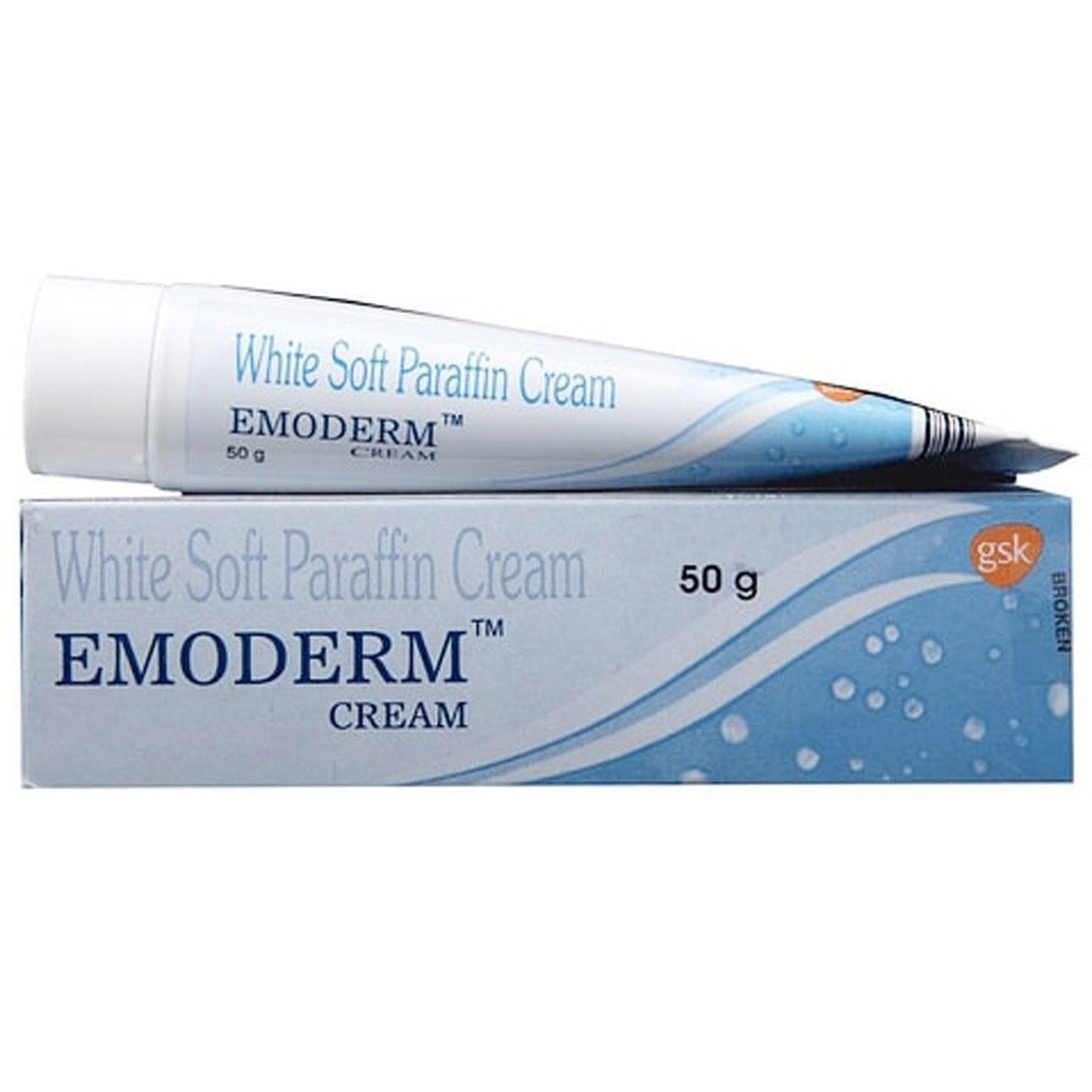Emoderm Cream 50 gm
MRP ₹87.5
(Inclusive of all Taxes)
₹10.5 Cashback (12%)
Provide Delivery Location
Online payment accepted
 Prescription drug
Prescription drugWhats That
Composition :
Manufacturer/Marketer :
Consume Type :
Expires on or after :
Return Policy :
About Emoderm Cream
Emoderm Cream belongs to the group of medicines called 'emollients' used to treat itchy, irritating dry skin problems associated with eczema and dermatitis.
Emoderm Cream contains ‘Liquid paraffin’ that works by soothing, moisturising, and conditioning the skin. It also helps prevent moisture loss from the skin and makes it soft, supple, less rough, scaly, itchy, and irritated.
In some cases, Emoderm Cream may cause redness, itching, rash, and irritation. Most of these side effects do not require medical attention and will resolve gradually over time. However, if the side effects persist or worsen, consult a doctor.
Do not use Emoderm Cream if you are allergic to any of its components. Consult your doctor if you are pregnant or breastfeeding. Avoid contact of Emoderm Cream with eyes, nose or mouth; if contact occurs, rinse with water thoroughly.
Uses of Emoderm Cream
Directions for Use
Key Benefits
Emoderm Cream belongs to the group of medicines called 'emollients' used to treat itchy, irritating dry skin problems associated with eczema and dermatitis. Emoderm Cream contains ‘Liquid paraffin’ that works by soothing, moisturising, and conditioning the skin. It also helps prevent moisture loss from the skin and makes it soft, supple, less rough, scaly, itchy, and irritated.
Storage
- Avoid scratching the affected area.
- Wear loose clothing to reduce irritation.
- Keep the affected area moisturized with a gentle moisturizer.
- To alleviate the reaction, remove the irritant by immediately stopping contact and washing the area with mild soap and cool water.
- Apply a cool, wet compress to reduce inflammation and itching.
- Consult a doctor if your skin reaction is severe, widespread, or accompanied by swelling, blistering, or breathing difficulties.
- Report the itching to your doctor immediately; they may need to change your medication or dosage.
- Use a cool, damp cloth on the itchy area to help soothe and calm the skin, reducing itching and inflammation.
- Keep your skin hydrated and healthy with gentle, fragrance-free moisturizers.
- Try not to scratch, as this can worsen the itching and irritate your skin.
- If your doctor prescribes, you can take oral medications or apply topical creams or ointments to help relieve itching.
- Track your itching symptoms and follow your doctor's guidance to adjust your treatment plan if needed. If the itching persists, consult your doctor for further advice.
Drug Warnings
Do not use Emoderm Cream if you are allergic to any components. Consult your doctor if you are pregnant or breastfeeding. Do not wrap or cover the treated area with a bandage unless advised by your doctor. If your condition does not improve despite using Emoderm Cream for a few days, consult your doctor. Let your doctor know if you are taking suggested/non-suggested medicines, including supplements or herbal products.
Drug-Drug Interactions
Drug-Drug Interactions
Login/Sign Up
Drug-Food Interactions
Drug-Food Interactions
Login/Sign Up
Diet & Lifestyle Advise
- Eat foods rich in quercetin (a flavonoid), such as apples, cherries, broccoli, spinach and blueberries.
- Consuming food rich in probiotics helps in developing the immune system against allergies.
- Avoid consuming foods with excess sugar, as it may flare up inflammation.
- Include fruits, vegetables, whole grains, healthy fats and fish in your diet.
- Reducing stress and maintaining a good sleep cycle would be helpful.
- Avoiding getting in contact with harsh soaps, detergents and rough fabrics.
Side Effects of Emoderm Cream
- Redness
- Itching
- Irritation
- Rash
Habit Forming
Therapeutic Class
All Substitutes & Brand Comparisons
Author Details
We provide you with authentic, trustworthy and relevant information
Drug-Diseases Interactions
Drug-Diseases Interactions
Login/Sign Up
FAQs
Special Advise
- Clean and dry the affected area before using Emoderm Cream.
- Do not use Emoderm Cream on dressing, band-aids and make-up unless told by the doctor.
- If Emoderm Cream comes in contact with eyes, nose or mouth, rinse with water immediately.
- Wash your hands before and after using Emoderm Cream; however, do not wash your hands if you are applying Emoderm Cream on your hands.
Disease/Condition Glossary
Eczema: Eczema, also known as atopic dermatitis, is a condition that causes patches of itchy, inflamed, swollen skin. It could occur due to stress, hormonal changes, irritating substances, food allergies, upper respiratory tract infections, or chemicals in detergents. Symptoms of eczema include itching, red patches, bumps, and scaly skin.
Dermatitis: It is generally known as skin inflammation. Dermatitis symptoms include rashes, blisters, cracked/dry skin, itching, redness, swelling, stinging or burning sensation. Dermatitis could occur due to stress, hormonal changes, irritating substances, or family history.

Have a query?
Alcohol
Safe if prescribed
It is not known whether alcohol interacts with Emoderm Cream. Please consult your doctor.
Pregnancy
Consult your doctor
Limited data is available. If you are pregnant, please consult your doctor before using Emoderm Cream.
Breast Feeding
Consult your doctor
Limited data is available. If you are breastfeeding please consult your doctor before using Emoderm Cream.
Driving
Safe if prescribed
Emoderm Cream is unlikely to affect your ability to drive.
Liver
Consult your doctor
Limited data is available. Please consult your doctor if you have any concerns regarding the usage of Emoderm Cream in patients with liver impairment.
Kidney
Consult your doctor
Limited data is available. Please consult your doctor if you have any concerns regarding the usage of Emoderm Cream in patients with kidney impairment.
Children
Safe if prescribed
Limited information is available. Please consult your doctor if you have any concerns regarding the usage of Emoderm Cream in children.





_0.jpg?tr=q-85)

